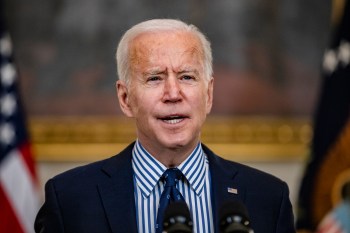
How extending unemployment benefits leads to a stronger recovery
How extending unemployment benefits leads to a stronger recovery

Another 853,000 people filed for state unemployment benefits last week, marking the highest number of claims since September. More than 400,000 people also applied for Pandemic Unemployment Assistance, a federal program that will expire Dec. 26.
A second program expiring in a few weeks extends unemployment benefits for 13 weeks. Alix Gould-Werth is the director of family economic security policy at the Washington Center for Equitable Growth. She spoke with “Marketplace” host Kai Ryssdal about why an extension of unemployment benefits often leads to better jobs for workers. The following is an edited transcript of their conversation.
Kai Ryssdal: So explain to us, would you, why extending unemployment benefits actually means that people who are without employment right now might wind up with a better job?
Alix Gould-Werth: Yeah, so this is a question that policy wonks in the unemployment insurance community has been thinking about for, like, a really long time. So there’s this team at Georgetown that got access to the right data to answer this question. The bottom line is that when workers can use unemployment benefits to meet their basic needs while they’re out of work, they’re able to take the time they need to find the right job for them rather than taking the first thing that comes along. This helps workers find jobs that pay more, and it helps employers find workers with the skills that meet their needs. And we call that a good job match.
Ryssdal: Which all makes sense, but the ethos of unemployment in this country, at least on a surface level is — both for society and and also for the individual is — man, I got to get off unemployment soon, because I got to get a job ’cause holy cow, I need a job, right?
Gould-Werth: Exactly. Yeah. The entire research literature around unemployment insurance is really characterized by this idea that the longer it’s taking me to find a job, the worse it is. This study is really exciting, because the research team is turning that idea on its head, and it’s challenging this logic. It’s saying, what if taking longer isn’t actually bad? What if it’s good?
Ryssdal: Talk to me about the mechanics. How is it better?
Gould-Werth: Sure. So when I have the money that I need to put food on the table, to keep my lights on, to pay the rent, it means that I can take the time I need to find a job that is the right match for my skills and my needs. And so then when I get matched with that job, I take it. So it takes a little bit longer. But then I end up with a job that generally pays higher wages and takes advantage of the skills I have to offer. And if I’m passing off a job that is not a good fit for me, it leaves that job open for a worker who is the right fit. And that’s creating a chain reaction that spreads throughout the economy.
Ryssdal: And then is the flip side that if you take the job that isn’t right, not only will you be not happy and maybe not make as much money as you might ordinarily, but you might eventually leave that job? And then the spiral continues. And then you get to what Jay Powell talks about all the time, which is this lasting damage thing.
Gould-Werth: Exactly right. So we see scarring effects of unemployment that lasts throughout workers careers, where they see lower wages 10, 20 years into the future, because they’re matching with those wrong jobs.
Ryssdal: So as we wait for Congress to decide what it’s going to do, are we in that zone already, where people are taking jobs that maybe aren’t the right fit? Have we missed the boat as it were?
Gould-Werth: I absolutely do not think we have missed the boat. So the Pandemic Emergency Unemployment Compensation is expiring the day after Christmas. And if we let it expire, we’re going to immediately cut 2 million unemployed workers off from any income from unemployment benefits, shorten their time on benefits for millions more. And that’s going to start this spiral of families hungry, rent unpaid, workers taking bad job matches. But right now, Congress is in the middle of negotiations. They have a chance to extend those pandemic emergency benefits, so that workers can wait for a job that’s right for them. Not only for their skills and their wages, but also a job that is safe and is a match for their health needs and the health needs of their families.
There’s a lot happening in the world. Through it all, Marketplace is here for you.
You rely on Marketplace to break down the world’s events and tell you how it affects you in a fact-based, approachable way. We rely on your financial support to keep making that possible.
Your donation today powers the independent journalism that you rely on. For just $5/month, you can help sustain Marketplace so we can keep reporting on the things that matter to you.


















